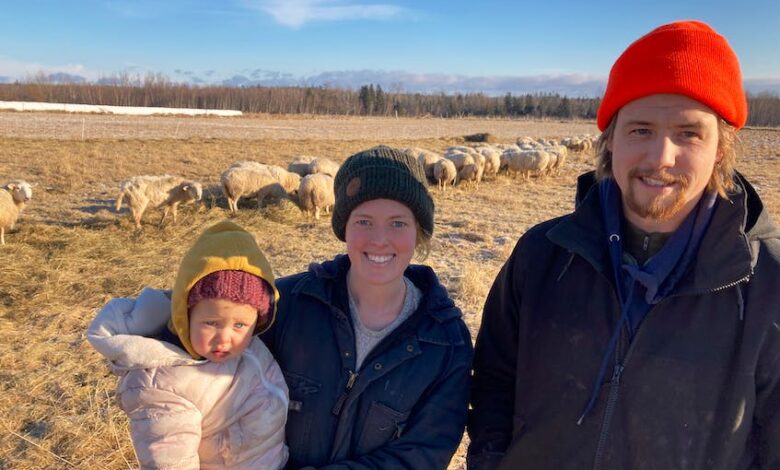Young and bravely farming sheep in Nova Scotia’s Wallace Bay

It’s been two years of bad prices and then a summer where the rain rarely let up long enough to get their half-century-old, two-wheel drive International on the fields.
But Abi and Adam Steeves are buying the land under their feet anyway.
“It’s daunting,” said Adam. “But prices are picking up. We’ll make it work.”
He watched the family’s 100 ewes part like water for Abi and 18-month-old Willow as they came down the fields. They’ve leased this land at the head of Wallace Bay, Cumberland County, for four years as they’ve grown their flock on Nova Ley Farm.
They live in a tiny home atop the fields Abi built with her father while pregnant with Willow, and Adam works full time at a neighbouring dairy farm.
All they’ve got and much that they don’t will go into buying this land.
This is what building a livestock operation from scratch looks like.
And it is preciously rare in Nova Scotia, where the knowledge and capital required to raise animals for meat form such a high bar of entry that few who aren’t born into it take the plunge.
“If we don’t have people producing food, where are we going to get it?” said Graham Reid.
The 84-year-old and his wife Ruth can watch the Steeves from their bungalow.

In 1970, they took the same plunge — moving from Port Hilford, Guysborough County, to buy this farm and replace its cattle with sheep.
“You wonder how you’re going to make the payments, but it’s exciting too,” remembered Reid. “New lambs in the spring gives you a boost, watching crops come up gives you a boost.”
They raised two boys, grew their flock to 450 ewes and made a life on the land as so many once-active fields along the Northumberland Shore went fallow. At 80 years old, Graham reluctantly retired.
Easing this transition was that Adam and Abi came looking to lease the pasture and barn and keep hooves on the ground.
Ruth and Graham being “very fair” is the only reason Adam figures they are able to make the hard math of rearing livestock work in a province where housing and cottage development have pushed prices far beyond what the land can pay for.

Without knowing them, Adam and Abi would have seemed unlikely shepherds.
Neither grew up farming — Abi’s father is a carpenter and Adam’s is co-founder of independent book publisher Gaspereau Press.
“I always managed to keep a pig or goat around growing up — I just liked it,” said Abi.
Adam knew he wanted to work outside, be independent and create something.
They met while both working at a sheep farm farther up the shore.
They dove in head first.
They started an accelerated breeding program that saw them divide their initial flock of 30 Rideau Arcott sheep in three so that one group was always gestating, another breeding and another growing their lambs.
It’s labour intensive.

When the sheep are lambing, they can’t be left alone.
Adam would come after working a full day at the dairy farm to join Abi keeping lambs warm and dry and seeing they got that first vital drink of colostrum.
Many nights were spent sleeping on the square bales in the barn before delivering silage to the ewes on the pasture and heading back to work at the dairy farm.
Adam’s two years of running and maintaining his father’s printing press came in handy as he struggled to maintain old farming equipment.
“It taught you not to be afraid of a problem anyway,” he said.
But sometimes you give in.
Between rains one wet summer, they finally got the tractor on the field but breakdowns meant that in eight hours they only managed to cut an acre.
There’s a special place in Hell for machinery that gives up the ghost when the sun’s out and the grass is high.
A call to Fort Equipment in Amherst and they got their first new piece of equipment — a mower.
COVID happened and the price went up to over $4 a pound and they were making money.
Something happened to Australian production and a big operator out west went under and the price fell below the cost of production.
Deep trenches now frozen in the muck speak to a summer where the rain never stopped and the old International in the barn is an apprenticeship in diesel mechanics.
But there’s help from older farmers nearby.
Abi’s started a side business of cut flowers and sells at the farmers market.
There’s bigger dreams ahead, like a few cows and maybe a new barn.
And they’re earning a stoicism rare in 20-somethings.
Graham and Ruth have been watching them.
“The weather will be what it will be,” said Graham.
“There were years when it was drought. But this is a good shore for farming.”
Abi and Adam and Willow are buying in, eyes wide open.



